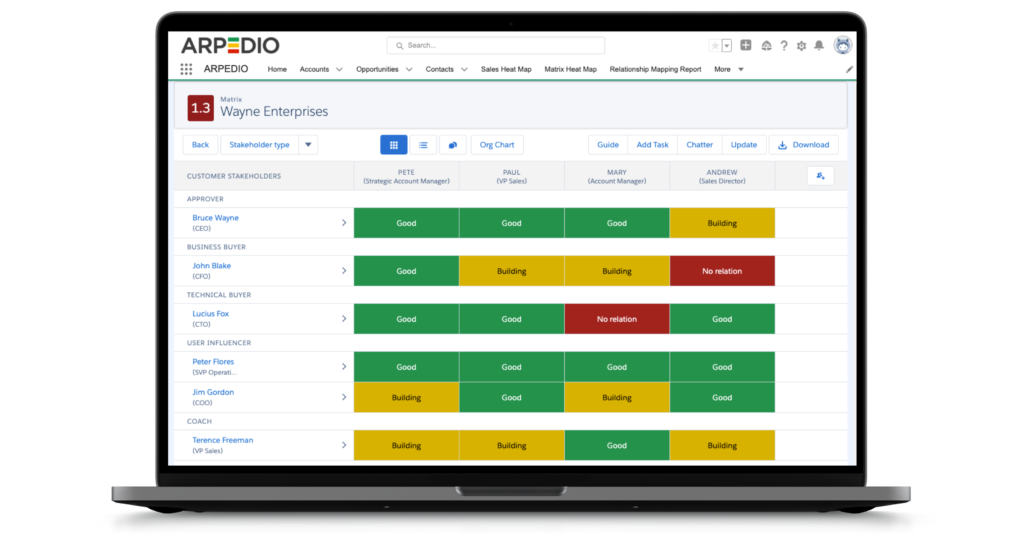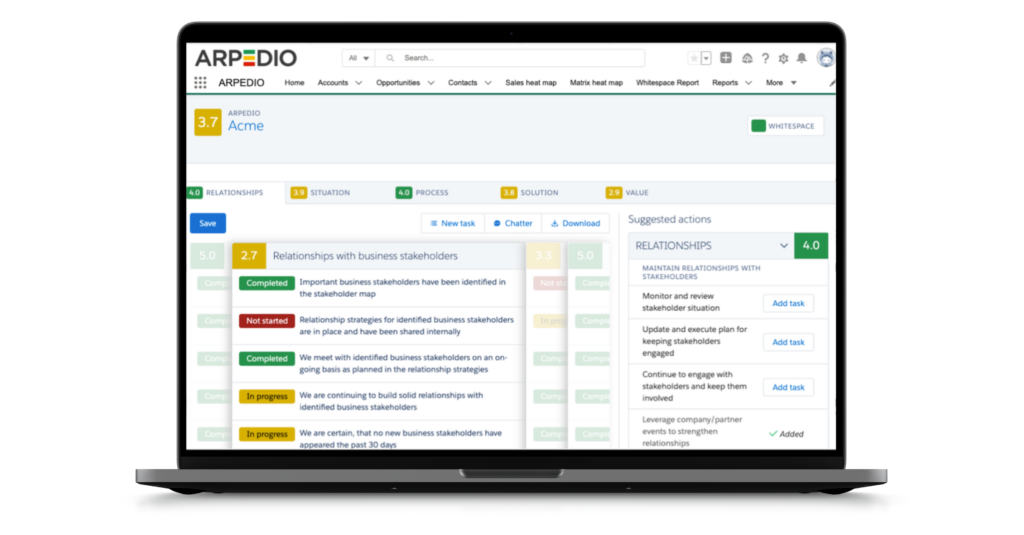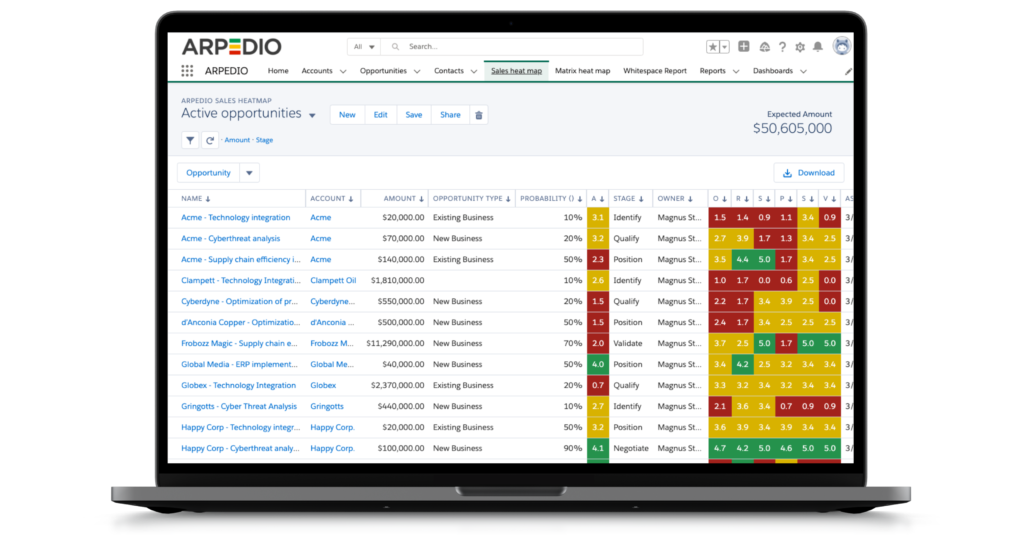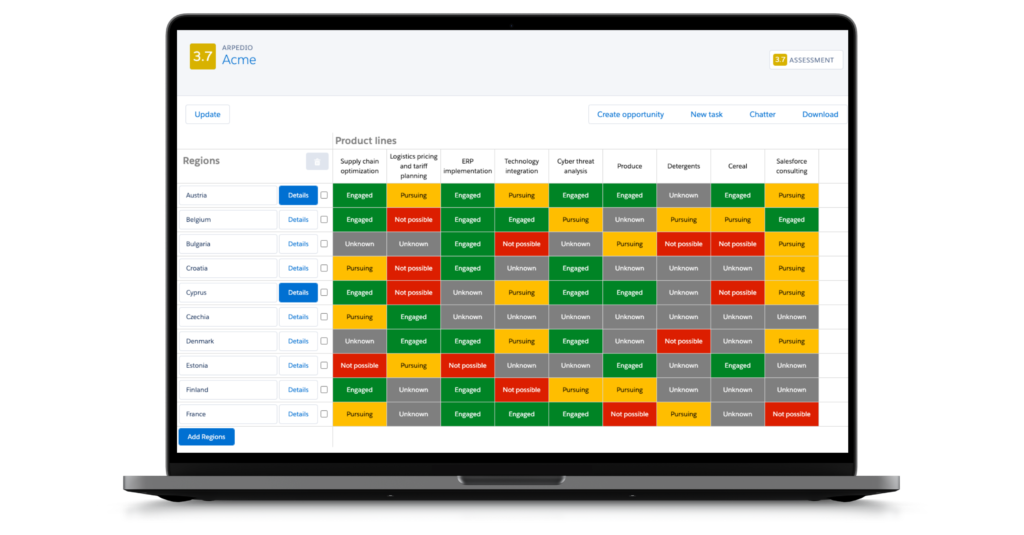With the right software you can enhance your networking capabilities, streamline communication, and optimize your relationship-building efforts for long-term success. In this blogpost, we’ll delve into the exciting realm of relationship mapping technologies and explore how they have the power to transform your approach to relationship management, so you can navigate the path to success with confidence and precision.
Table of Contents
What is Relationship Management?
In today’s interconnected business landscape, effective relationship management is a critical factor in achieving sustainable success. Relationship management is a fundamental concept that encompasses the strategies, practices, and techniques employed to cultivate and nurture connections with various stakeholders. Whether it’s building strong personal relationships, establishing a loyal customer base, or fostering collaborative partnerships, effective relationship management plays a crucial role in achieving success in various aspects of your business life.
At its core, relationship management involves understanding the needs, expectations, and preferences of individuals or entities with whom you interact. It goes beyond simple transactions and focuses on building trust, rapport, and mutual understanding. By prioritizing relationship management, you can forge long-lasting connections that lead to beneficial outcomes for all parties involved.
Communication lies at the heart of relationship management. Tailoring your communication style to match the preferences of your counterparts enhances understanding and facilitates smoother interactions. Whether it’s face-to-face conversations, phone calls, or digital communication, clear and concise messages, combined with active engagement, contribute to building stronger relationships.
In today’s digital age, there’s no denying that technology plays a significant role in relationship management. Leveraging technology through an account-based selling platform can streamline your efforts, organize data, and personalize interactions at scale. These technological tools enhance efficiency and effectiveness in managing relationships. By consistently delivering on commitments, being reliable, and following up with contacts, you demonstrate your dedication and maintain ongoing engagement. Regular communication and proactive follow-ups ensure that relationships continue to flourish and evolve over time.
All in all, relationship management is a strategic practice that focuses on nurturing and developing connections with various stakeholders. By prioritizing effective communication and consistency, you can build and maintain strong relationships that contribute to personal and professional success. Embracing technology can optimize your relationship management efforts, allowing you to streamline processes and enhance your overall effectiveness.
Core Concepts and Principles
Relationship management in sales encompasses the strategies and practices employed to foster strong connections with customers, prospects, and other stakeholders throughout the sales process. At its core, relationship management involves building trust, understanding needs, and nurturing long-term partnerships to drive sales success.
Key principles of relationship management in sales include:
Trust and Credibility: Trust is the foundation of any successful sales relationship. Sales professionals must demonstrate integrity, reliability, and transparency to establish credibility with their prospects and customers.
Communication: Effective communication is essential for understanding customer needs, addressing concerns, and conveying the value of products or services. Sales professionals should actively listen to clients, ask probing questions, and provide clear and concise information to foster productive dialogues.
Value Creation: Relationship management goes beyond transactional interactions; it focuses on delivering value to customers at every stage of the sales journey. By understanding customers’ challenges and goals, sales professionals can tailor solutions that meet their specific needs and exceed expectations.
Personalization: One-size-fits-all approaches are ineffective in sales relationship management. Sales professionals should personalize their interactions with clients, demonstrating genuine interest and empathy to build rapport and connection.
Adaptability: The sales landscape is constantly evolving, and successful relationship management requires adaptability to changing market dynamics, customer preferences, and competitive pressures. Sales professionals must continuously assess and adjust their strategies to stay relevant and competitive.
Types of Relationships
In sales, relationships can be categorized into various types, each requiring a tailored approach to management:
Personal Relationships: These are connections based on mutual interests, shared experiences, or personal affiliations outside of the business context. While personal relationships can influence purchasing decisions, sales professionals must balance authenticity with professionalism to maintain boundaries and credibility.
Professional Relationships: Professional connections are built within the business environment, such as partnerships with colleagues, industry peers, or stakeholders. These relationships often rely on mutual respect, collaboration, and shared goals to drive business success.
Customer Relationships: Customer relationships are at the heart of sales relationship management. Building strong bonds with customers involves understanding their needs, delivering exceptional service, and providing ongoing support to foster loyalty and retention.
Vendor Relationships: Sales professionals also interact with vendors, suppliers, and other external partners to deliver products or services to customers. Effective vendor relationships rely on clear communication, trust, and collaboration to ensure seamless operations and value delivery.
Benefits of Effective Relationship Management
Implementing effective relationship management strategies in sales offers numerous benefits for both sales professionals and their organizations:
Increased Sales Revenue: Strong relationships with customers and prospects lead to higher conversion rates, repeat business, and upsell opportunities, ultimately driving revenue growth.
Enhanced Customer Loyalty: Building trust and rapport with customers fosters loyalty and reduces churn, resulting in long-term partnerships and sustainable revenue streams.
Improved Customer Satisfaction: By understanding and addressing customer needs proactively, sales professionals can deliver personalized solutions and exceptional service, leading to higher levels of customer satisfaction and advocacy.
Competitive Advantage: Building strong relationships with customers and stakeholders can differentiate a company from competitors, providing a unique selling proposition and positioning it as a preferred partner in the marketplace.
Long-Term Success: Investing in relationship management cultivates a culture of customer-centricity and fosters a positive reputation, laying the foundation for sustained success and growth in the long run.
In summary, understanding the core concepts, types, and benefits of relationship management in sales is essential for sales professionals seeking to build meaningful connections, drive revenue, and achieve long-term success in today’s competitive business landscape. By prioritizing trust, communication, and value creation, sales professionals can cultivate strong relationships that deliver mutual value and drive business growth.
What is Relationship Management Software?
Relationship management software can be a powerful tool that transforms the way sales professionals approach nurturing and maintaining their stakeholders. Take for instance ARPEDIO’s account-based selling solutions; the advanced tools leverage advanced technologies to streamline relationship management processes, enhance networking capabilities, and optimize overall relationship-building efforts.
Relationship management software, like ARPEDIO’s Relationship Mapping Solution, offers a comprehensive solution for managing and organizing complex networks of relationships. With automated data collection and organization features, this software enables users to import and analyze contact information, interactions, and communication history effortlessly. By eliminating manual tracking methods, ARPEDIO’s relationship management software frees up valuable time and resources, allowing users to focus on building meaningful connections.
One of the key benefits of relationship management software is its ability to visualize network relationships. Through interactive org charts, maps, and graphical representations, users gain a holistic view of their relationships. These visualizations provide valuable insights into key influencers, knowledge gaps, and emerging opportunities, empowering users to make informed decisions and strategically navigate their network.
Users can access communication histories, notes, and preferences, enabling them to tailor their messages to individual contacts. This level of personalization strengthens connections and fosters engagement.
Another powerful feature of relationship management software is its data analytics and reporting capabilities. By analyzing trends, patterns, and the effectiveness of relationship management efforts, users can make data-driven decisions and refine their strategies for optimal outcomes. These insights empower users to allocate resources efficiently and focus on relationships with the greatest potential for success.
To sum up, relationship management software, like ARPEDIO’s Relationship Mapping Solution, is a game-changer for sales professionals seeking to optimize their relationship management efforts. By leveraging advanced technologies, this software streamlines processes, enhances networking capabilities, and provides valuable insights into relationships. Integrating relationship management software into your approach can help you unlock the full potential of your connections, build stronger relationships, and achieve long-term success.
Customer Relationship Management (CRM) Software
CRM software has become an indispensable tool for businesses of all sizes and industries seeking to streamline their sales processes, improve customer interactions, and drive revenue growth. In today’s highly competitive marketplace, where customer experience is paramount, CRM systems offer a comprehensive solution for managing relationships with customers and prospects effectively.
What Does A CRM System Do?
A CRM system, short for Customer Relationship Management, is a software solution designed to streamline and centralize the management of customer interactions, data, and relationships. Here’s an overview of what a CRM system does:
Centralized Database: A CRM system serves as a centralized database where businesses can store and organize customer information, including contact details, communication history, purchase history, and preferences. This centralized repository allows sales teams to access up-to-date and comprehensive customer data in one place.
Lead Management: CRM software helps businesses manage leads throughout the sales pipeline, from initial contact to conversion. Sales professionals can track leads, assign tasks, and nurture relationships with prospects through automated workflows and reminders.
Contact Management: CRM systems enable businesses to maintain accurate and detailed records of contacts, including customers, prospects, partners, and suppliers. Sales teams can segment contacts based on various criteria, such as demographics, purchase history, or engagement level, to target them with personalized communications and marketing campaigns.
Communication Tracking: CRM software tracks all customer interactions, including emails, phone calls, meetings, and social media engagements. This comprehensive view of communication history allows sales professionals to follow up on leads, address customer inquiries, and track the progress of deals more effectively.
Sales Pipeline Management: CRM systems provide visibility into the sales pipeline, allowing businesses to track the progress of deals, forecast revenue, and identify potential bottlenecks or opportunities for optimization. Sales teams can prioritize leads, manage tasks, and collaborate with colleagues to move deals through the pipeline efficiently.
Reporting and Analytics: CRM software offers reporting and analytics capabilities to help businesses measure performance, track key metrics, and identify trends. Sales teams can generate custom reports, analyze data insights, and make informed decisions to improve sales strategies and drive business growth.
In summary, a CRM system serves as a comprehensive solution for managing customer relationships and sales processes, offering functionalities such as centralized data management, lead and contact management, communication tracking, sales pipeline management, and reporting and analytics.
Why Do You Need A CRM System?
Implementing a CRM system offers numerous benefits for businesses looking to enhance their sales processes, improve customer relationships, and drive growth. Here are some reasons why you need a CRM system:
Centralized Data Management: A CRM system centralizes customer data in one accessible platform, eliminating the need for disparate spreadsheets or manual record-keeping. This centralized repository ensures data accuracy, consistency, and security, enabling sales teams to make informed decisions based on up-to-date information.
Improved Efficiency and Productivity: CRM software automates repetitive tasks, such as data entry, lead assignment, and follow-up reminders, freeing up time for sales professionals to focus on building relationships and closing deals. By streamlining workflows and eliminating manual processes, CRM systems increase efficiency and productivity across the organization.
Enhanced Customer Relationships: CRM systems enable businesses to deliver personalized experiences and tailored solutions to customers, based on their preferences, purchase history, and interactions. By understanding and anticipating customer needs, sales teams can build trust, foster loyalty, and strengthen long-term relationships with clients.
Better Sales Forecasting and Planning: With insights into the sales pipeline and performance metrics, CRM software allows businesses to forecast revenue, track progress toward goals, and identify areas for improvement. This visibility enables sales teams to allocate resources effectively, prioritize leads, and optimize sales strategies to meet targets and drive growth.
Scalability and Growth: As businesses grow and acquire new customers, CRM systems provide scalability to accommodate expanding data volumes, user needs, and business requirements. Cloud-based CRM solutions offer flexibility and agility, allowing businesses to scale up or down seamlessly and adapt to changing market conditions.
Competitive Advantage: Implementing a CRM system gives businesses a competitive edge by enabling them to deliver exceptional customer experiences, streamline sales processes, and stay ahead of competitors. By leveraging data-driven insights and automation capabilities, businesses can differentiate themselves in the marketplace and attract and retain customers more effectively.
In summary, a CRM system is essential for businesses looking to optimize sales processes, improve customer relationships, and drive sustainable growth. By centralizing data management, increasing efficiency, enhancing customer experiences, enabling better decision-making, and gaining a competitive advantage, CRM software empowers businesses to achieve success in today’s dynamic and competitive marketplace.
How to Unlock the Full Potential of Relationship Management in Salesforce
Salesforce provides features and functionalities for effective relationship management. With its comprehensive suite of tools, Salesforce empowers businesses to build, nurture, and optimize their connections with customers, partners, and stakeholders.
One of the key strengths of Salesforce is its ability to centralize and organize customer data. The platform allows businesses to store and access critical customer information, including contact details, communication history, and preferences, in a single location. This centralized data repository streamlines relationship management by providing a holistic view of customer interactions and enabling personalized engagement.
Additionally, integrating external tools with Salesforce can significantly enhance the user experience, unlocking a new realm of possibilities and maximizing the platform’s capabilities. By seamlessly integrating complementary applications, such as ARPEDIO, businesses can tailor Salesforce to their specific needs, streamline workflows, and boost productivity.
By harnessing the power of external tools, businesses can enhance the user experience within Salesforce, resulting in increased efficiency, improved data quality, and ultimately, better business outcomes with a comprehensive and unified workspace.
Relationship Management Examples
Now we’ve established what relationship management is and how to use it in a business context. But what does a relationship map actually look like? Below you can see examples of ARPEDIO’s Relationship Mapping tool in action.
Essential Relationship Management Skills for Success
Relationship management skills are the foundation for building and maintaining strong connections with others. These skills are crucial across personal, professional, and business relationships. Here are a few essential relationship management skills to cultivate:
- Communication: Effective communication lies at the heart of relationship management. Active listening, clear and concise expression, and adapting communication styles to suit different individuals and situations are key communication skills to develop.
- Trust-building: Building trust is essential for meaningful relationships. Being reliable, honest, and transparent, and following through on commitments are critical trust-building skills.
- Conflict Resolution: Conflict is a natural part of any relationship. Developing conflict resolution skills, such as active listening, seeking compromise, and maintaining diplomacy, enables you to navigate disagreements effectively and maintain harmonious relationships.
- Adaptability: Relationships evolve over time, and being adaptable is key to managing change and new dynamics. Flexibility, open-mindedness, and willingness to adjust your approach contribute to successful relationship management.
- Time Management: Effective relationship management requires allocating time and resources appropriately. Developing time management skills allows you to prioritize relationships, balance commitments, and demonstrate dedication.
Effective Strategies for Successful Relationship Management
Relationship management strategies are essential for nurturing and maintaining strong connections with others. Implementing effective strategies can help you build trust, enhance communication, and foster long-lasting relationships. Here are a few key strategies to consider:
- Personalization: Tailoring your interactions and communication to meet the specific needs and preferences of each individual strengthens relationships.
- Consistent Engagement: Regular and consistent engagement is vital for relationship management. Make it a priority to stay in touch, show genuine interest, and be responsive.
- Mutual Value Creation: Successful relationships thrive when both parties benefit. Strive to create mutual value by identifying ways to support and help your key stakeholders in achieving their goals. Seek opportunities for collaboration and win-win outcomes, ensuring that the relationship remains mutually beneficial.
- Continuous Learning and Growth: Relationships evolve, and investing in continuous learning and growth is crucial for effective relationship management. Stay updated on industry trends, acquire new skills, and seek feedback to improve your ability to contribute value to the relationship.
Technology Integration: Leverage technology tools and platforms to streamline relationship management. ARPEDIO’s account-based selling platform can help you manage and organize complex networks of relationships.
Establishing Trust and Credibility
Transparency and Authenticity: Be transparent in your interactions with clients, providing honest information about products, services, and pricing. Authenticity builds trust and fosters genuine connections with customers.
Consistency in Communication: Maintain regular and consistent communication with clients to demonstrate reliability and commitment. Respond promptly to inquiries, address concerns proactively, and follow through on promises to reinforce trustworthiness.
Active Listening and Empathy
Importance of Understanding Others’ Perspectives: Practice active listening to understand clients’ needs, challenges, and goals fully. Empathize with their experiences and perspectives to build rapport and foster deeper connections.
Techniques for Active Listening: Use techniques such as paraphrasing, summarizing, and asking clarifying questions to demonstrate engagement and understanding during conversations with clients. Show genuine interest in their concerns and actively seek solutions to address them.
Effective Communication
Clear and Concise Messaging: Communicate information clearly and concisely to ensure understanding and avoid confusion. Tailor your messaging to resonate with the specific needs and preferences of each client, using language that is accessible and relatable.
Choosing the Right Communication Channels: Utilize a mix of communication channels, including email, phone calls, video conferencing, and in-person meetings, to accommodate clients’ preferences and facilitate seamless interactions. Adapt your communication style and approach based on the context and nature of each interaction.
Building Rapport and Connection
Finding Common Ground: Look for common interests, experiences, or values that you share with clients to establish common ground and foster a sense of connection. Building rapport based on shared experiences strengthens relationships and enhances trust.
Personalizing Interactions: Tailor your interactions with clients to reflect their unique preferences, personalities, and communication styles. Show genuine interest in their lives, hobbies, and aspirations, demonstrating that you value them as individuals beyond their business relationships.
Managing Expectations
Setting Realistic Goals and Boundaries: Clearly define expectations and objectives for the relationship from the outset, ensuring alignment between your offerings and clients’ needs. Establish boundaries to manage scope, timeframes, and responsibilities effectively.
Addressing Concerns and Resolving Conflicts: Proactively identify and address potential issues or conflicts that may arise during the course of the relationship. Be responsive to clients’ concerns, listen to their feedback, and collaborate on solutions to achieve mutually beneficial outcomes.
By implementing these key strategies for effective relationship management, sales professionals can cultivate trust, foster engagement, and build lasting partnerships with their clients. Investing time and effort in nurturing relationships pays dividends in terms of customer satisfaction, loyalty, and business success in the long run.
Building Strong Connections with Business Relationship Management
When talking about business relationship management, the main focus is nurturing and cultivating connections with key stakeholders to drive success in the corporate world. It involves building and maintaining strong relationships with customers, vendors, partners, and other relevant entities. Business relationship management emphasizes understanding the needs and expectations of stakeholders, delivering exceptional customer experiences, and fostering collaborative partnerships. By prioritizing effective communication, trust-building, and mutual value creation, businesses can forge long-lasting connections that lead to increased customer loyalty, successful partnerships, and a competitive edge in the market.
Conclusion: Mastering Relationship Management for Success
By prioritizing effective communication, empathy, trust-building, and conflict resolution, businesses can foster strong connections and achieve mutually beneficial outcomes. Whether it’s customer relationships, vendor relationships, employee relationships, or strategic partnerships, relationship management plays a crucial role in nurturing connections and driving success. Leveraging advanced technologies with relationship mapping software like ARPEDIO’s account-based selling platform can further enhance efficiency and effectiveness in managing relationships, and even revolutionize your approach to cultivating and nurturing valuable connections. To put it simple: The power of the right relationship mapping technologies can elevate your relationship management strategies to new heights.
#1 Account-Based Selling Platform
Powerful alone. Superior together.
Boost win rates and reduce sales cycles. Enhance forecast accuracy.









